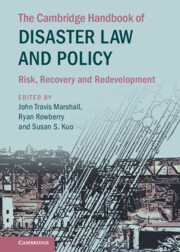Book contents
- The Cambridge Handbook of Disaster Law and Policy
- The Cambridge Handbook of Disaster Law and Policy
- Copyright page
- Dedication
- Contents
- Figures
- Maps
- Tables
- Contributors
- Foreword: Current Trends in Disaster Law and Policy
- Acknowledgments
- Introduction
- Part I Critical Perspectives on the Evolution of Disaster Law and Policy
- Part II Effective Governance as an Imperative for Responsive Disaster Law and Policy
- Part III Law’s Role in Promoting Hazard Mitigation: Intergovernmental, International, National, and Local Approaches
- Part IV Private Sector Initiatives to Promote Disaster Resilience and Recovery
- Part V Lawyers As Disaster Law and Policy Leaders: Training for Students and Guidance for Practitioners
- Part VI Cultural Heritage Protection and Cross-Disciplinary Opportunities for Advancing Disaster Law and Policy
- 26 Scheduled Monuments and Sites at Risk of Coastal Erosion: Danish Heritage Legislation and Actions
- 27 Heritage-Related Disaster Policy in the United States
- 28 Love for Heritage in the Time of Covid-19: Pandemics and Preparedness
- 29 Reflections on Urban Cultural Heritage, Public Health, and Public Participation
- Part VII Disasters and Vulnerable Communities
28 - Love for Heritage in the Time of Covid-19: Pandemics and Preparedness
from Part VI - Cultural Heritage Protection and Cross-Disciplinary Opportunities for Advancing Disaster Law and Policy
Published online by Cambridge University Press: 27 October 2022
- The Cambridge Handbook of Disaster Law and Policy
- The Cambridge Handbook of Disaster Law and Policy
- Copyright page
- Dedication
- Contents
- Figures
- Maps
- Tables
- Contributors
- Foreword: Current Trends in Disaster Law and Policy
- Acknowledgments
- Introduction
- Part I Critical Perspectives on the Evolution of Disaster Law and Policy
- Part II Effective Governance as an Imperative for Responsive Disaster Law and Policy
- Part III Law’s Role in Promoting Hazard Mitigation: Intergovernmental, International, National, and Local Approaches
- Part IV Private Sector Initiatives to Promote Disaster Resilience and Recovery
- Part V Lawyers As Disaster Law and Policy Leaders: Training for Students and Guidance for Practitioners
- Part VI Cultural Heritage Protection and Cross-Disciplinary Opportunities for Advancing Disaster Law and Policy
- 26 Scheduled Monuments and Sites at Risk of Coastal Erosion: Danish Heritage Legislation and Actions
- 27 Heritage-Related Disaster Policy in the United States
- 28 Love for Heritage in the Time of Covid-19: Pandemics and Preparedness
- 29 Reflections on Urban Cultural Heritage, Public Health, and Public Participation
- Part VII Disasters and Vulnerable Communities
Summary
It is inevitable that 2019 and 2020 will long be remembered as the time when most countries in the world were affected by coronavirus disease 2019 (Covid-19), an infectious disease caused by the severe acute respiratory syndrome coronavirus 2 (SARS-CoV-2) that, in severe cases, may lead to pneumonia and multi-organ failure. The World Health Organization declared the disease a pandemic on March 11, 2020. In an effort to stem the transmission of the virus, many jurisdictions have legally required most of their populations to stay home and have ordered the closure to the public of cultural institutions such as heritage sites and museums. In a situation where staff are mostly working from home and there are few, if any, employees on site, such institutions and the artefacts they hold may be left vulnerable to damage and looting. Moreover, how cultural institutions can maintain their relevance as heritage resources may be a challenge both during and after the pandemic. This chapter considers what cultural institutions may do to address these challenges, and what the law and government policies can do to assist.
- Type
- Chapter
- Information
- The Cambridge Handbook of Disaster Law and PolicyRisk, Recovery, and Redevelopment, pp. 451 - 467Publisher: Cambridge University PressPrint publication year: 2022



